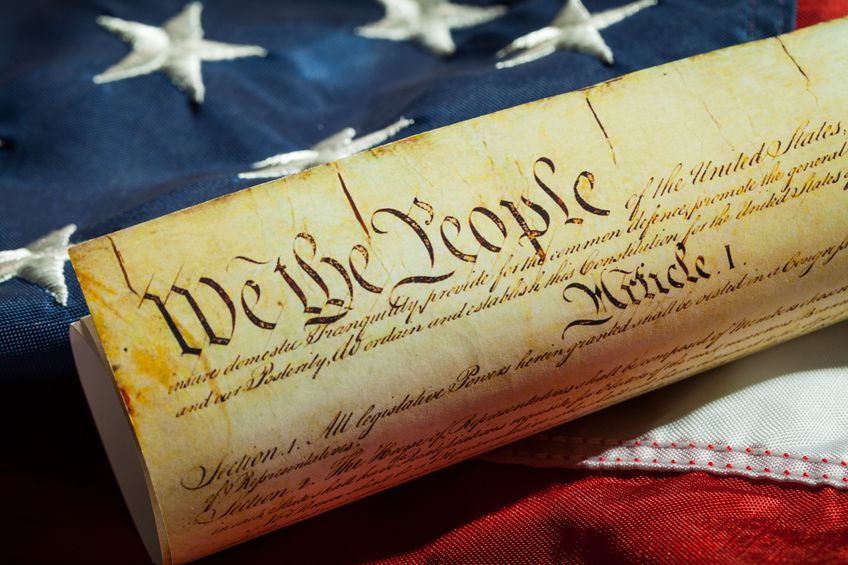By JON FAULKNER
Last week, invoking his wartime authority under the 1798 Alien Enemies Act, President Donald Trump bypassed the courts and deported137 alleged Venezuelan members of the Tren de Aragua gang. Almost immediately, Judge James E. Boasberg, the chief judge for the U.S. District Court in D.C., issued a restraining order instructing President Trump to “turn the plane around” that was deporting illegal aliens with known criminal violations out of the country.
The incident has sparked a constitutional battle over the limits of judicial power over the president. The immediate question is whether U. S. District Court judges have the power to constrain the president by issuing nationwide injunctions or other rulings that seek to intervene in the execution of executive branch prerogatives or duties.
Some legal authorities regard Trump’s actions as flaunting the rule of law, while Trump and others argue the law is not fixed in this regard, and that Americans are tired of illegal immigrants seeking delay and refuge from an over-burdened court system. Others point to foreign manipulation and financing of the entire immigration wave, which they view as intentional and designed to destabilize our national security.
The Alien Enemies Act extends broad powers to the president that some argue he already constitutionally possesses, but which powers historically have only been invoked during wartime — most notably during WWII to justify imprisonment of Japanese Americans.
Alaska appellate attorney and Substack author Ralph Cushman is convinced federal judges do not have the power Judge Boasberg has asserted. In the first place, he says, only the Supreme Court has (“original”) jurisdiction to even hear such a case. Article III, Section 2, of the Constitution says:
“In all Cases affecting Ambassadors, other public Ministers and Consuls, and those in which a State shall be party, the Supreme Court shall have original jurisdiction. In all the other cases before mentioned, the Supreme Court shall have appellate jurisdiction, both as to law and fact, with such exceptions, and under such regulations as the Congress shall make.”
“Original jurisdiction” means it must be filed in that court.
And even if the Supreme Court does hear such a case, says Cushman, it does not have the power to issue injunctions or mandates against the president or his (cabinet) ministers. Otherwise “the executive power” is not “vested in the president,” — it is vested in judicial overseers.
Finally, even if the Supreme Court rules that a presidential action is unconstitutional, Cushman contends, it still cannot issue injunctions or mandates. Rather, it is up to the Senate to impeach him for it. If the Senate does not see fit to convict in impeachment, then the president is free to continue to execute the laws of the United States as s/he sees fit. The framers of the Constitution never intended for the federal courts to have the authority to order the president or his ministers around. National security and the well-being of the country do not have time for such interference with their executive duties.
Similarly, says Cushman, U. S. District Judge Reyes was without jurisdiction to order the Department of Defense to admit transsexuals. If a House member believes the president is breaking some law by banning transsexuals from military duty, s/he can float an article of impeachment.
But impeachment is all the president needs to, and should need to, worry about. Republicans have lately been criticizing the federal courts for issuing “nationwide injunctions” against the president, as if local injunctions would be permissible.
But they aren’t, Cushman contends, because the courts do not have jurisdiction to enter injunctions restricting the president’s exercise of his powers as commander in chief, or as executive.
American are divided on the subject of whether our Constitution should be interpreted by the courts using a narrow “strict constructionist” view of the original intent of the framers, or using a broader context that emphasizes present-day social, political and economic objectives.
A recent Washington Post story outlined Trump’s legal argument to the court, concluding that,“Years of experience have shown that the Executive Branch cannot properly perform its functions if any judge anywhere can enjoin every presidential action everywhere.”
The same article quotes U.S. Attorney General Pam Bondi as calling Boasberg’s order an “intrusion on the president’s authority…These are foreign terrorists. The president has identified them and designated them.”
While some legal experts criticize Trump for challenging a long-standing balance of power between branches of government, others believe its overdue. Regardless, there is consensus that the issue is ripe for review by SCOTUS.
“This issue has never been properly litigated,” states Cushman. “The encroachment by the Judiciary into the Executive branch has been slow and steady over time, but there is little case law to reference. Trump’s push-back to the federal courts is entirely justified — by the Constitution.”
The issue of judicial authority has broad implications for the executive, especially in the area of immigration. Trump’s recent Supreme Court filing urges SCOTUS to sanction Trump’s ban on birthright citizenship at a state level, but Trump’s ban is awaiting clarification by the high court.
Jon Faulkner is the president of Alaska Gold Communications, the parent company of Must Read Alaska.
